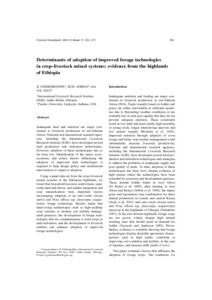CGIAR is the only worldwide partnership addressing agricultural research for development, whose work contributes to the global effort to tackle poverty, hunger and major nutrition imbalances, and environmental degradation.
It is carried out by 15 Centers, that are members of the CGIAR Consortium, in close collaboration with hundreds of partners, including national and regional research institutes, civil society organizations, academia, development organizations and the private sector.
The 15 Research Centers generate and disseminate knowledge, technologies, and policies for agricultural development through the CGIAR Research Programs. The CGIAR Fund provides reliable and predictable multi-year funding to enable research planning over the long term, resource allocation based on agreed priorities, and the timely and predictable disbursement of funds. The multi-donor trust fund finances research carried out by the Centers through the CGIAR Research Programs.
We have almost 10,000 scientists and staff in 96 countries, unparalleled research infrastructure and dynamic networks across the globe. Our collections of genetic resources are the most comprehensive in the world.
What we do
We collaborate with research and development partners to solve development problems. To fulfill our mission we:
- Identify significant global development problems that science can help solve
- Collect and organize knowledge related to these development problems
- Develop research programs to fill the knowledge gaps to solve these development problems
- Catalyze and lead putting research into practice, and policies and institutions into place, to solve these development problems
- Lead monitoring and evaluation, share the lessons we learn and best practices we discover;
- Conserve, evaluate and share genetic diversity
- Strengthen skills and knowledge in agricultural research for development around the world
Making a difference
We act in the interests of the world’s poorest and most vulnerable. Our track record spans four decades of research.
Our research accounted for US$673 million or just over 10 percent of the US$5.1 billion spent on agricultural research for development in 2010. The economic benefits run to billions of dollars. In Asia, the overall benefits of CGIAR research are estimated at US$10.8 billion a year for rice, US$2.5 billion for wheat and US$0.8 billion for maize.
It has often been cited that one dollar invested in CGIAR research results in about nine dollars in increased productivity in developing countries.
Sweeping reforms for the 21st century
Political, financial, technological and environmental changes reverberating around the globe mean that there are many opportunities to rejuvenate the shaky global food system. Developments in agricultural and environmental science, progress in government policies, and advances in our understanding of gender dynamics and nutrition open new avenues for producing more food and for making entrenched hunger and poverty history.
The sweeping reforms that brought in the CGIAR Consortium in 2010 mean we are primed to take advantage of these opportunities. We are eagerly tackling the ever more complex challenges in agricultural development. We are convinced that the science we do can make even more of a difference. To fulfill our goals we aim to secure US$1 billion in annual investments to fund the current CGIAR Research Programs.
CGIAR has embraced a new approach that brings together its strengths around the world and spurs new thinking about agricultural research for development, including innovative ways to pursue scientific work and the funding it requires. CGIAR is bringing donors together for better results and enabling scientists to focus more on the research through which they develop and deliver big ideas for big impact. As a result, CGIAR is more efficient and effective, and better positioned than ever before to meet the development challenges of the 21st century.
We are no longer the ‘Consultative Group on International Agricultural Research’. In 2008 we underwent a major transformation, to reflect this and yet retain our roots we are now known simply as CGIAR.
Members:
Resources
Displaying 10806 - 10810 of 12598Developing effective institutions for water resources management: A case study in the Deduru Oya Basin, Sri Lanka
This report is based on a research project financed by the Asian Development Bank (ADB) to conduct a regional study for the development of effective water management institutions (ADBRETA no 5812). Research activities were conducted in five river basins in Indonesia, the Philippines, Nepal, China and Sri Lanka for a period of three years commencing from 1999. The river basin studied in Sri Lanka was the Deduru Oya river basin in the North Western Province of the country. This report contains the findings of the Deduru Oya basin study.
Determinants of adoption of improved forage technologies in crop-livestock mixed systems: Evidence from the highlands of Ethiopia
Inadequate feed and nutrition are major constraints to livestock production in sub-Saharan Africa. National and international research agencies, including the International Livestock Research Institute (ILRI), have developed several feed production and utilisation technologies. However, adoption of these technologies has so far been low. Identification of the major socio-economic and policy factors influencing the adoption of improved feed technologies is required to help design policy and institutional interventions to improve adoption.
Decentralization viewed from inside: the implementation of community forests in East Cameroon
Cameroon's 1994 Forestry law launched a new approach to natural resource management. The 1996 Constitution introduced decentralized authorities, whose role is to enable the economic, social and cultural development of its peoples. The new legal framework for environmental policy and overhaul of the Constitution show the Government's will to decentralize and to improve forest resources management. At the same time, decentralization management might be inappropriate in Cameroon.
Cuantificación de la macrofauna del suelo en una cuenca hidrográfica de Colombia
Conserving soils and water
A co-ordinator for Zambia?s Programme Against Malnutrition explains methods of conservation farming which can help to conserve both soil moisture and nutrients in areas experiencing dry spells.



